Nov 1, 2020
༢༠༢༠ སྤྱི་ཟླ་ ༡༠ ཚེས་ ༣༡ རེས་གཟའ་སྤེན་པ། ཨ་རིའི་གྲོང་ཁྱེར་ནེའུ་ཡོག་གི་ཞོགས་པའི་ཆུ་ཚོད། ༡༡ | བོད་ཀྱི་གཏམ་དཔེ
་མི་ཚེའི་བསླབ་བྱ། སྡེ་ཚན་གཉིས་པ།
In a live Internet broadcast hosted by Geshe Tenzin Wangyal, some of the best-known living poets/scholars of Tibet — Lama Jabb, Jangbu, Tsering Kyi and Geshe Beri Jigmey Wangyal — recite a variety of Tibetan proverbs. These are old sayings typically conveyed by elders to young people, teachers to students, and parents to children as an everyday means of sharing wisdom and knowledge. Note: This broadcast is in Tibetan language only.
View recording on Facebook (73 minutes) to join the chat
The Proverbs
Jangbu (Dorje Tsering Chenaktsang):
དཔྱིད་ཉི་ཟིག་ག་དྲོ་འཁྱག་གསུམ། །
མི་ཚེ་ཟིག་ག་སྐྱིད་སྡུག་གསུམ། །
དཔྱིད་ཉི་རིང་པོར་དྲོ་གསུམ་དང་གྲང་གསུམ། །
མི་ཚེ་རིང་པོར་སྐྱིད་གསུམ་དང་སྡུག་གསུམ། །
ཁ་བདེ་པོ་མི་ཡི་དཔོན་པོ་དང་།།
ལག་བདེ་པོ་མི་ཡི་གཡོག་པོ་ཡིན།།
ཁ་བདེ་ན་སྡེ་བའི་དཔོན་པོ།།
ལག་བདེ་ན་སྡེ་བའི་གཡོག་པོ།
ལྕགས་ཀྱི་རིལ་བུ་བཟས་ན།།
རྡོ་ཡི་འགྲམ་སོ་དགོས།།
ཁྱོས་ལྕགས་གི་ཐུ་ལུམ་བཟའ་ན། །
རྣོ་གི་མཆོ༼མཆེ་བ༽དགོས་ནི་རེད།
ཆང་ནད་ཆང་གིས་བསངས།།
ཆང་དུག་ཆང་གིས་ལེན།།
ནད་པ་རྒད་པོ་ཨེམ་རྗེ་ཡིན།།
ནད་པ་རྙིང་པ་སྨན་པ་ཡིན།།
ཁ་ཁ་རོག་བསྡད་ན་ཁ་མཆུ་མེད།།
མགོ་རུམ་དུ་བཅུག་ན་ལྷགས་པ་མེད།
ཁ་ཁ་རོག་བསྡད་ན་ཁ་མཆུ་མེད། །
མགོ་ལག་པས་བསྐྱོར་ན་རྒྱག་ནི་མེད། །
གྲོག་མ་འགྲོ་འགྲོ་མང་ན།།
རྐང་ལག་ཐང་ཆུས་འཛིན།།
གྲོག་མར་འགྲོ་འདུར་ཆེ་ན་།
རྐང་ལག་ཐང་ཆུར་འབྱར་ར་། །
ང་སྦལ་པ་ས་འོག་ཏུ་ཡོད་ཀྱང་།།
བསམ་པ་གླིང་དཀར་སྟོད་ན་ཡོད།།
ཁྱོད་སྦལ་བ་ན་སྐོང་ནང་ནས།
བསམ་པ་གླིང་དཀར་སྟོད་རེད་ད།
རྐུ་རྒྱུས་ཡོད་ཀྱིས་བྱེད།།
རྫུན་རྒྱུས་མེད་ཀྱིས་ཤོད།
ཆ་ཡོད་ཀྱི་རྐུ་དང་ཆ་མེད་ཀྱི་རྫུན་དེ་།
ཡ་ཆུང་ན་སེམས་མེད་ན།
ཡ་ཐོད་ན་མྱིག(མིག)་མེད།།
ཨེབ་ར་ཧེབ་གཉིས་ཐོད་ཐུག་ནས། །
ཁྱི་ཉམས་སྤྲང་པོས་ལོན་ནས་རྒྱུག་པ་ཕྲེད་གཟེར།།
ཆུ་ཉམས་མཉན་པས་ལོན་ནས་ཀོ་བ་ཕྲེད་གཅོད།།
ང་སྤགས་ལས་བཟོས་པའི་མི་དང་།།
ཁྱོད་ལྕགས་ལས་གྲུབ་པའི་ཁྱི་མ་རེད།།
མཚོ་སྔོན་པོར་སོང་ནས་ཐོན་རག་གོ
མིག་སྔོན་པོས་ལོག་ནས་འཆི་རྒྱུ་རེད་ཅན་པོ།
ལྕམ་སྐུ་ཞབས་ཀྱི་འགྲོ་སྟངས་མ་ཤེས་པར་བུ་མོ་རང་གི་འགྲོ་སྟངས་ཤོར་བ།
གཏམ། ཁ་དཔེ། གཏམ་དཔེ།།ཁ་གཏམ།།
དཔེ་ཆོས།།
གཏམ་གྱི་ཐོག་མ་ཀུ་རེ་།།
ཟས་མཆོད་ཀ་མེད་ལ་བཟའ་སྲོལ་མེད།།
གཏམ་ཀུ་རེ་མེད་ལ་བཤད་སྲོལ་མེད།།
Tsering Kyi:
Proverbs to come
Geshe Beri Jigmey Wangyal:
བོད་ཀྱི་གཏམ་དཔེ།
བེ་རི་འཇིགས་མེད།
བཤད་ཆེས་ན་ཕ་གཏམ་བུ་ལ་ཕོག།
ཟ་ཆེས་ན་རྩམ་པས་མཆིན་ཁ་ན།།
༢
གཏམ་ཨ་ཕས་བཤད་རྒྱུ་ཨ་མས་བཤད།།
ཁྱི་བདག་པོས་བཀག་རྒྱུ་མགྲོན་པོས་བཀག།
༣
སྐྲག་དགོས་སར་ཀི་བརྒྱབ།།
ཁྲེལ་དགོས་སར་མཇེ་བསྟན།།
༤
ཡ་ཀི་བྲག་ལ་བརྒྱབ་ན་སྐག་སྒྲ་མེད།།
མ་ཀི་ཆུ་ལ་མཆོང་ན་སྙོག་དྲ་མེད།།
ཁ་ནང་རྡོ་ལུ་བཅུག་ན་ཧྲག་སྒྲ་མེད།།
༥
སྟག་ལྤགས་ཀྱི་ཁིལ་མོ།།
གོས་ཆེན་གྱི་ཐབ་ཕྱིས།།
མཆིག་འཁོར་གོང་ལ་གསེར་ཇོ།།
༦
ཡར་མི་གཏོང་ལྟག་པས་གཉའ་ཤིང་།།
མར་མི་གརོང་ཐག་ནག་གིས་སྒྱིད་ཕྱན།།
ཁ་ནང་ཚ་སྤྱད།།
མྱིག་ནང་རྡོལ་སྤྱད།།
༧
རྟ་བརྒྱ་ལ་ལ་འགྲོ་དུས་བོང་གུ་འཕྲེད་ལ་འགྲོ།
༨
ཆོས་བཤད་ཉ་པས་ཁ་ལ་ལྟོས།།
རྟོགས་ལྡན་ང་ལ་ཉམས་ལེན་མེད།།
༩
བུ་དགའ་ན་གཅིག་གིས་ཆོག།
ཧུག་སྐ་ན་གང་གིས་ཆོག།
༡༠
མགོ་ཐོག་བུམ་པ།།
ལྕེ་ཐོག་བདུད་རྩི།།
About the Presenters
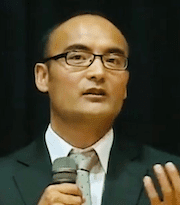 Lama Jabb (མདའ་ཚན་བླ་མ་སྐྱབས) was born and brought up in the Dhatsen tribe, a nomadic community in Northeastern Tibet. He studied in Tibet, India and the UK and received his Ph.D. from the University of Oxford. He is currently a Supernumerary Fellow in Tibetan and Himalayan Studies and the head of the Tibetan and Himalayan Studies Centre at Wolfson College, and instructor in Tibetan at the faculty of Oriental Studies, University of Oxford. Lama Jabb’s research and writing center on the interplay between the Tibetan literary text and oral traditions, literary criticism, translation theory and practice, and contemporary Tibet. He is the author of Oral and Literary Continuities in Modern Tibetan Literature: The Inescapable Nation (2015) and many articles, including “The Wandering Voice of Tibet: Life and Songs of Dubhe” (2019).
Lama Jabb (མདའ་ཚན་བླ་མ་སྐྱབས) was born and brought up in the Dhatsen tribe, a nomadic community in Northeastern Tibet. He studied in Tibet, India and the UK and received his Ph.D. from the University of Oxford. He is currently a Supernumerary Fellow in Tibetan and Himalayan Studies and the head of the Tibetan and Himalayan Studies Centre at Wolfson College, and instructor in Tibetan at the faculty of Oriental Studies, University of Oxford. Lama Jabb’s research and writing center on the interplay between the Tibetan literary text and oral traditions, literary criticism, translation theory and practice, and contemporary Tibet. He is the author of Oral and Literary Continuities in Modern Tibetan Literature: The Inescapable Nation (2015) and many articles, including “The Wandering Voice of Tibet: Life and Songs of Dubhe” (2019).
མདའ་ཚན་བླ་མ་སྐྱབས་ནི་བོད་མདོ་སྨད་ཀླུའི་ཨ་མྱེས་ཆབ་བྲག་དང་ཀླུ་ཆུའི་འགྲམ་རྒྱུད་ཀྱི་གཡག་སྙིང་ཞེས་པའི་རི་འདབས་སུ་སྟོད་སོག་མདའ་ཚན་གྱི་སྦྲ་ནག་ཅེས་པའི་འབྲོག་སྡེ་རུ་སྐྱེས་ཤིང་གནས་དེར་འཚར་ལོངས་བྱུང་། བོད་དང་རྒྱ་གར་དབྱིན་ཡུལ་བཅས་ནས་སློབ་གྲྭ་ཆུང་འབྲིང་ཆེ་གསུམ་འགྲིམས། ཕྱི་ལོ༢༠༠༠ལོ་ནས་༢༠༠༤ལོའི་བར་ལོན་ཊོན་སློབ་གྲྭ་ཆེན་མོའི་ཨཧྥེརིཁ་དང་ཤར་ཕྱོགས་རིག་པའི་སློབ་གླིང་(School of Oriental and African Studies, University of London)་ནས་ཆབ་སྲིད་རིག་པ་དང་རྒྱལ་སྤྱིའི་འབྲེལ་ལམ་རིག་པ་སྦྱངས་ནས་རིམ་པ་བཞིན་སློབ་གྲྭ་ཆེན་མོ་བའི་ལག་ཁྱེར་དང་ཞིབ་འཇུག་སློབ་མའི་ལག་ཁྱེར་བླངས། ཕྱི་ལོ༢༠༠༨་ལོ་ནས་༢༠༡༣ལོའི་བར་ཨོཀཁེསེཧྥོརཌི་སློབ་གྲྭ་ཆེན་མོའི་(University of Oxford)ཤར་ཕྱོགས་རིག་པའི་སྡེ་ཁག་(Faculty of Oriental Studies)དང་ཝོབསེན་སློབ་གླིང་(Wolfson College)དུ་ནུབ་ལུགས་རྩོམ་རིག་གཞུང་ལུགས་དང་དགག་སྒྲུབ་རིང་ལུགས། སྤྱི་ཚོགས་དང་མིའི་རིགས་རིག་པ་སོགས་ཀྱི་རིགས་ལམ་བརྒྱུད་དེ་དེང་རབས་བོད་ཀྱི་རྩོམ་རིག་ལ་དཔྱིས་ཕྱིན་པའི་ཉམས་ཞིབ་དང་འདྲི་རྩད་གཏིང་ཟབ་བྱས་ནས་འབུམ་རམས་པའི་དམ་བཅའ་བཞག
ད་སྐབས་མདའ་ཚན་བླ་མ་སྐྱབས་ནི། དབྱིན་ཡུལ་ཨོཁེསེཧྥོར་ཌི་སློབ་གྲྭ་ཆེན་མོའི་དགེ་རྒན་ཆེན་མོ་དང་། ཉམས་ཞིབ་པ་ཡིན་ལ། སློབ་ཆེན་དེ་ག་རང་དུ་ཁོང་ལ་ཞིབ་འཇུག་གི་གོ་གནས་རྩ་ཆེན་ལིཝིརཧཱུྃ་ཉམས་ཞིབ་གོ་གནས་(Leverhulme Early Career Fellowship)དང་དམིགས་བསལ་ཉམས་ཞིབ་པའི་ཆོ་ལོ་(Supernumerary Fellow)ཡང་གནང་ཡོད། ཁོང་ལ་རྒྱལ་སྤྱིའི་ཐོག་གདེང་འཇོག་ཡག་པོ་བྱེད་ཀྱིན་པའི་དབྱིན་ཡིག་གི་ལམ་ནས་བྲིས་པའི་དཔེ་དེབ་ ༼བོད་ཀྱི་དེང་རབས་རྩོམ་རིག་གི་ཡིག་ངག་རྩོམ་རྒྱུན་ཏེ། གཡོལ་ཐབས་མེད་པའི་རང་ཡུལ། (Oral and Literary Continuities in Modern Tibetan Literature: The Inescapable Nation)༽དང་དཔྱད་རྩོམ་༼བདུད་བྷེའི་མི་ཚེ་དང་གླུ་གཞས་ཏེ་བོད་ཀྱི་གླུ་སྐད་ལྡོམ་པོ། The Wandering Voice of Tibet: Life and Songs of Dubhe༽སོགས་དེང་རབས་བོད་ཀྱི་རྩོམ་རིག་དང་། ལོ་རྒྱུས། སྤྱི་ཚོགས་སོགས་ལ་ཞིབ་འཇུག་བྱེད་སྐབས་ཀློག་དགོས་པའི་བརྩམས་ཆོས་གང་ལེགས་མཆིས་སོ།
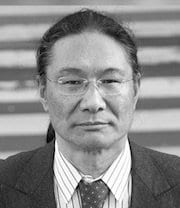 Dorje Tsering Chenaktsang Dorje, commonly known by his pen name, Jangbu, was born in a nomadic community in northeastern Tibet and graduated from the Northwest University for Nationalities (Xibei minzu daxue) in Lanzhou. He then worked as a teacher at a Tibetan middle school before becoming editor of the Tibetan-language literary journal Tibetan Art and Literature in Lhasa. From 2002 to 2008 he taught Tibetan at the National Institute for Oriental Languages and Civilizations (INALCO) in Paris.
Dorje Tsering Chenaktsang Dorje, commonly known by his pen name, Jangbu, was born in a nomadic community in northeastern Tibet and graduated from the Northwest University for Nationalities (Xibei minzu daxue) in Lanzhou. He then worked as a teacher at a Tibetan middle school before becoming editor of the Tibetan-language literary journal Tibetan Art and Literature in Lhasa. From 2002 to 2008 he taught Tibetan at the National Institute for Oriental Languages and Civilizations (INALCO) in Paris.
Jangbu is one of the best-known poets in contemporary Tibet and has won numerous literary awards at both regional levels (Qinghai province and Tibet Autonomous) and national levels. His works, which have been translated into many languages, include The Nine-Eyed Agate (2010), a collection of poetry and stories translated into English by Heather Stoddard; and Le Hachoir invisible (2012), a collection of poems translated into French by Françoise Robin et Élise Mandine. Jangbu is the founder and organizer of Waterfall of Youth (2003 until present), the first and only independent Tibetan poetry festival in Tibet.
Jangbu also has directed documentary films about contemporary Tibet including Tantric Yogi (2005), Kokonor (2005), Ani Lachem (2005), Yartsa Rinpoche (2014), and his work-in-progress Voices of the Stone. He is the father of two children and divides his life between France and Tibet.
ལྗང་བུ། རུས་མིང་དངོས་ལྕེ་ནག་ཚང་།རྡོ་རྗེ་ཚེ་རིང་།
ཕྱི་ལོ ༡༩༦༣ལོར་བོད་མདོ་སྨད་རྨ་ཆུའི་བཞུར་རྒྱུད་བོད་སོག་འདྲེས་མའི་ཡུལ་སོག་པོ་མདའ་བཅུ་གཅིག་ཟེར་པ་དེའི་ལུང་ཁུག་ཅིག་གི་བྲག་མཆོད་རྟེན་གྱི་ཞོལ་སྐུ་ཁང་བྱ་བའི་གནས་དེ་རུ་སྐྱེས། ཁྱོན་མིང་སྲིང་བཅུ་ཡོད་་པ་ལས་གསུམ་པ་དེ་ཡིན་འདུག
ཕ་འཇམ་དབྱངས་ཐུབ་བསྟན་དང་མ་ཨ་དགེ་སྒྲོན་དཀར་སྐྱིད་གཉི་ག་བོད་ཀྱི་རུས་རྒྱུད་དང་སོག་པོའི་ཁྲག་རྒྱུན་ཡོད་པ་རེ་ཡིན་འདུག
ལོ ༧བར་དུ་འབྲོག་པ་ཤ་སྟག་གི་འཚོ་བར་རོལ། དེ་ནས་ལོ ༢༥ བར་བོད་དང་རྒྱ་ནག་ནས་སློབ་གྲྭ་འགྲིམ། ལུང་ཁུག་ཅིག་གི་སློབ་གྲྭའི་དགེ་རྒན་ལོ་གསུམ་དང་ལྷ་ས་རུ་སྔ་རྗེས་ལོ་བཅུ་བཞིའི་རིང་་སྲིད་གཞུང་གི་དྲུང་ཡིག་དང་རྒྱ་ཡིག་ཚགས་པར་གཅིག་དང་བོད་ཡིག་དུས་དེབ་གཉིས་ནང་ཡིག་རྫི་ལྟ་བུའི་རྩོམ་སྒྲིག་པ་བཅས་བྱས་མྱོང་། ཧྥ་རན་སིའི་སློབ་གྲྭ་ཆེན་མོ་ཞིག་ལ་ཀ་ཁའི་དགེ་རྒན་ལོ་དྲུག་བྱས། སྙན་ངག་གིས་མཚོན་དེབ་ཁ་ཤས་སྐད་རིགས་དུ་མའི་ནང་པར་སྐྲུན་བྱས་མྱོང་། གློག་བརྙན་ཁ་ཤས་བཟོས་མྱོང་། སྙན་ངག་དུས་ཆེན་ཞིག་གཉེར་མྱོང་། གློག་བརྙན་འཁྲབ་གཞུང་ཁ་ཤས་བྲིས་མྱོང་། རིག་གཞུང་ཁྱབ་སྤེལ་དང་། འཁོར་ཡུག་སྲུང་སྐྱོབས། བྱིས་པའི་སློབ་གསོའི་སྐོར་ལ་དང་བླང་གི་ལས་ཀ་མང་ཙམ་གཉེར་མྱོང་། ཕ་རན་སིའི་རྒྱལ་ཁབ་ཏུ་བུ་གཅིག་དང་བུ་མོ་གཅིག་ཡོད་པར་། བོད་དང་ཡུ་རོབ་བར་དུ་འགྲུལ་སྐྱོད་ཀྱི་རྣམ་པས་འཚོ་བ་རོལ་གྱིན་ཡོད།།
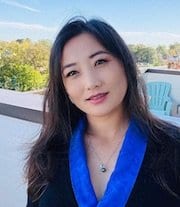 Tsering Kyi is a journalist, blogger, and poet. Born and raised in Amdo, eastern Tibet, Tsering Kyi has studied in Tibet, India, England, and Germany. While in India she became Miss Tibet in the early 2000s and later traveled to many countries to speak on the life experiences of Tibetan women and children. Afterward in Europe, Tsering Kyi studied English, Chinese, and journalism. For the past 15 years she has written poetry, musical lyrics, and articles in Tibetan, and published three books of poetry. Reflecting the high regard in Tibet for her poetry, her collected works have also been published. Tsering Kyi has been blogging longer than any other female Tibetan and has a readership of more than 1 million. She was was the sole woman in the well-known writers group Mirab Sumpa in Tibet. Her work reaches a wide audience of mainstream readers, including pastoralists, monks, nuns, students, and educators. She is active with several writers associations and works as a broadcast journalist for television and radio.
Tsering Kyi is a journalist, blogger, and poet. Born and raised in Amdo, eastern Tibet, Tsering Kyi has studied in Tibet, India, England, and Germany. While in India she became Miss Tibet in the early 2000s and later traveled to many countries to speak on the life experiences of Tibetan women and children. Afterward in Europe, Tsering Kyi studied English, Chinese, and journalism. For the past 15 years she has written poetry, musical lyrics, and articles in Tibetan, and published three books of poetry. Reflecting the high regard in Tibet for her poetry, her collected works have also been published. Tsering Kyi has been blogging longer than any other female Tibetan and has a readership of more than 1 million. She was was the sole woman in the well-known writers group Mirab Sumpa in Tibet. Her work reaches a wide audience of mainstream readers, including pastoralists, monks, nuns, students, and educators. She is active with several writers associations and works as a broadcast journalist for television and radio.
ཚེ་རིང་སྐྱིད། སྙན་ངག་འབྲི་དུས་ཆུ་མིག་ཅེས་ཀྱང་སྤྱད་མྱོང་།
སྤྱི་ལོ་༡༩༨༣ ལོར་བོད་མདོ་སྨད་ཨ་མཆོག་ས་ཆར་སྐྱེས་ཤིང་བོད་དུ་མཐོ་འབྲིང་བར་སློབ་གྲྭ་རིམ་པས་འགྲིམས་རྗེས་༡༩༩༩ལོ་རྒྱ་གར་ལ་ཡོང་ནས་བོད་ཁྱིམ་སུ་ཇ་སློབ་གྲྭ་སོགས་སློབ་གཉེར་བྱས་མྱོང་། སྤྱི་ལོ་༡༩༩༨ལོ་ནས་སྙན་ངག་ཐོག་མ་འབྲི་མགོ་བཙུགས་ཤིང་། བོད་ཀྱི་དམངས་ཁྲོད་ངག་རྒྱུན་སྙན་ངག་གིས་བག་ཆགས་ཆེན་པོ་བཞག
ཚེ་རིང་སྐྱིད་ཀྱིས་འདས་པའི་ལོ་ངོ་ཉི་ཤུའི་སྐྱབས་བཅོལ་བའི་མི་ཚེ་གཞི་ལ་བཞག་པའི་རྩོམ་རིག་གི་དེབ་གསུམ་དང་གློག་རྡུལ་འཕྲུལ་དེབ་གཅིག་བཅས་དཔར་བསྐྲུན་བྱེད་མྱོང་ལ། བོད་ནང་དུ་ཁོང་གི་སྙན་ངག་ལ་དགའ་མཁན་ཚོས་སྙན་ངག་ཕྱོགས་སྒྲིག་གིས་བོད་ནང་དུ་ཆུ་མིག་གི་བཞུར་རྒྱུན་དང་དབྱངས་ཅན་མའི་ཟླ་མཚན་གཉིས་དཔར་བསྐྲུན་བྱེད་མྱོང་། སྤྱི་ལོ་༢༠༠༥ལོ་ནས་བོད་ཕྱི་ནང་གི་དྲ་ལམ་དུ་རྩོམ་ཡིག་བརྒྱ་ཕྲག་བརྒལ་བ་སྤེལ་ཏེ་གནད་དོན་མང་པོའི་སྒང་གླེང་གཞི་འཁྲུག་ཆ་དོད་པོ་བཟོ་མཁན་ཞིག་ཡིན་པ་མ་ཟད་སྤྱི་ལོ་༢༠༠༧ལོར་བོད་ནང་གི་ཟིན་བྲིས་ཀློག་མཁན་མང་ཤོས་ཀྱི་ཟིན་བདག་ཅིག་ཡིན།
༢༠༠༩ལོ་ནས་བཟུང་ཨ་རིའི་རླུང་འཕྲིན་ཁང་དུ་བརྙན་འཕྲིན་དང་རླུང་འཕྲིན་གྱི་གཙོ་སྐྱོང་བ་དང་གསར་འགོད་པའི་ཕྱག་ལས་གནང་བཞིན་ཡོད།
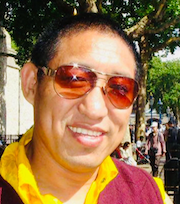 Geshe Beri Jigmey Wangyal was born in Tibet. He arrived in India in 1989 and studied at Drepung Monastery. In 2003 he was invited as a visiting scholar to Indiana University, U.S., where he taught a course in the history department. He received his geshe degree in 2004. He served as a member of the Tibetan Parliament in exile. He has participated in various international conferences and has taught students from many countries around the world. He is the author of 21 books. Currently he serves as a teacher and chair of the literature department at Central University for Tibetan Studies in Varanasi, India.
Geshe Beri Jigmey Wangyal was born in Tibet. He arrived in India in 1989 and studied at Drepung Monastery. In 2003 he was invited as a visiting scholar to Indiana University, U.S., where he taught a course in the history department. He received his geshe degree in 2004. He served as a member of the Tibetan Parliament in exile. He has participated in various international conferences and has taught students from many countries around the world. He is the author of 21 books. Currently he serves as a teacher and chair of the literature department at Central University for Tibetan Studies in Varanasi, India.
བེ་རི་དགེ་བཤེས་འཇིགས་མེད་དབང་རྒྱལ་ནི། ཆུང་དུས་རང་གི་ཡབ་ཆེན་མཁས་དབང་བློ་བཟང་དོན་ཡོད་ཀྱི་དྲུང་ནས་བོད་ཀྱི་ཐ་སྙད་ རིག་གཞུང་སྒྲ་སྙན་མངོན་སྡེབ། རྒྱལ་རབས་ཆོས་འབྱུང༌། དེབ་ཐེར་ལོ་རྒྱུས། རྒྱའི་སློབ་གྲྭ་ལས་རྒྱ་ཡིག་དང༌། ས་ཁམས། དངོས་ཁམས། ཆབ་སྲིད། ཨང་རྩིས་སོགས་ལའང་བསླབས་ནས་འབྲིང་སློབ་ཐོན། ཀླུ་སྦྱིན་དགེ་བཤེས་ཆེན་མོའི་དྲུང་ནས་ཕར་ཚད་ཀྱི་གཞུང་དང་ལམ་རིམ་ལ་བསླབས། ༡༩༨༩ ལོར་རྒྱ་གར་སླེབས་ནས་འབྲས་སྤུངས་སུ་ཞུགས། གཞུང་ཆེན་པོ་ལ་སློབ་གཉེར་འཕྲོ་མཐུད་བྱེད་པའི་ཞོར་དུ། ༡༩༩༣ ནས་བློ་གླིང་གཙུག་ལག་དཔེ་སྐྲུན་ཁང་གི་ཞུ་དག་པ་དང༌། ༡༩༩༥ ལོ་ནས་བློ་གསལ་གླིང་གི་སློབ་གྲའི་དགེ་རྒན་བྱས།
༡༩༩༦ ལོ་ནས་བློ་གསལ་རྩོམ་སྒྲིག་ཁང་གི་རྩོམ་སྒྲིག་འགན་འཛིན་བྱས། ༡༩༩༧ལོ་ནས་གངས་སུལ་གྱི་རོལ་དབྱངས་སློབ་སྟོན་པ་བྱས། ༢༠༠༡ ལོར་ལྡི་ལི་བོད་ཁང་ཟ་མ་ཏོག་གི་རྩོམ་སྒྲིག་ཚོགས་མི་བྱས། ༢༠༠༣ ལོ་ནས་ཨ་མི་རི་ཁ་ཨི་ཌི་ཨ་ན་IUགཙུག་ལག་སློབ་གྲྭ་ཆེན་མོར་ལོ་རྒྱུས་རིག་པའི་ཕྱོགས་ཕེབས་དགེ་རྒན་ཆེན་མོ་ བྱས། ༢༠༠༤ལོར་གཞུང་ལུགས་རབ་བྱམས་སྨྲ་བའི་དགེ་བཤེས་དམ་བཅའ་བཞག ལོ་དེ་ནས་སྐབས་བཅུ་གཉིས་པའི་དགེ་ལུགས་སྤྱི་འཐུས་བྱས། ༢༠༠༥ལོ་ནས་ནོར་གླིང་བོད་ཀྱི་རིག་གཞུང་ཞིབ་འཇུག་ཁང་དུ་ྋགོང་ས་མཆོག་གི་མཛད་ རྣམ་རྩོམ་སྒྲིག་པ་དང་ནོར་གླིང་མཐོ་སློབ་ཀྱི་དགེ་རྒན་བྱས། ༢༠༠༦ལོ་ནས་བཅུ་བཞི་པའི་དགེ་ལུགས་སྤྱི་འཐུས་བྱས། ༢༠༠༧ དང་ ༢༠༡༠ ལ་ཝཱ་ཎཱ་བོད་ཀྱི་ཆེས་མཐོའི་གཙུག་ལག་སློབ་གཉེར་ཁང་གི་དགེ་འོས་B.edདགེ་རྒན་ བྱས། ༢༠༡༠ ལོར་ཁ་ན་ཊ་བྷེ་གོ་ཀོ་ལི་བྷིང་ཡ་གཙུག་ལག་སློབ་གྲྭ་ཆེན་མོར་རྒྱལ་སྤྱི་བོད་རིག་པའི་ཞིབ་འཇུག་ཚོགས་ཆེན་དུ་བཅར། ༢༠༡༡ ལོར་ཨི་ཊ་ལི་བི་ལོར་ན་དྷོ་མེ་ན་དགོན་པས་གདན་ཞུས་ལྟར།་སེམས་ཁམས་རིག་པའི་ལྟ་གྲུབ་གྱི་བགྲོ་གླེང་དུ་སོང་ནས་ནུབ་པྱོགས་པ་དང་སངས་རྒྱས་ཆོས་ལུགས་པའི་སེམས་ཁམས་རིག་པའི་ལྟ་གྲུབ་ཐོག་བགྲོ་གླེང་རྒྱ་ཆེར་བྱས། ༢༠༡༥ལོར་འཇའ་མན་ལིབཛིག་གཙུག་ལག་སློབ་གྲྭ་ཆེན་མོར་རྒྱལ་སྤྱིའི་གཞོན་ནུ་བོད་རིག་པའི་ཚོགས་ཆེར་བཅར། ༢༠༡༦ ལོར་ནོ་ཝེར་རྒྱལ་སར་རྒྱལ་སྤྱིའི་བོད་རིག་པའི་ཚོགས་ཆེན་དུ་བཅར། ༢༠༡༨ ལོར་ཤྲི་ལངྐའི་རྒྱལ་ས་ཀོ་ལོ་པོར་ནང་ཆོས་རིག་པའི་ཚོགས་འདུར་གདན་ཞུས་ལྟར་བཅར། སྔ་ཕྱིར་ཨ་རི་དང༌། འཇའ་མན། དབྱིན་ལོན།་ཨི་ཊ་ལི་སོགས་ནུབ་ཕྱོགས་རྒྱལ་ཁབ་དུ་མར་རྒྱལ་སྤྱིའི་བོད་རིག་པའི་ཞུབ་འཇུག་དང༌། རྒྱལ་སྤྱིའི་གཞོན་ནུའི་བོད་རིག་པའི་ཞིབ་འཇུག་ཚོགས་ཆེན་དུ་མའི་ཐོག་གདན་ཞུས་ བྱུང་བ་ལྟར་འགྲོ་ཁུལ་བྱས་ནས་དེ་དག་ཏུ་བོད་རིག་པའི་དཔྱོད་བརྗོད་དུ་མ་སྤེལ་ཁུལ་བྱས། གཞིས་བྱེས་གཉིས་ཀྱི་ཆོལ་གསུམ་ཆོས་ལུགས་སེར་སྐྱ་རིས་མེད་ཐོག་རྒྱ་བལ་འབྲུག་ གསུམ་དང༌། སྦོ་རིཡ། ཨིཊ་ལི། འཇའ་མན། ཨ་རི། དབྱིན་ལོན་སོགས་རྒྱལ་ཁབ་དང་མི་རིགས་འདྲ་མིན་གྱི་སློབ་མ་སྟོང་ཕྲག་དུ་མ་བསྐྱངས། དུས་དེབ་དང་ཚགས་པར་ཁག་ཏུ་ནང་ཆོས་དང༌། སྙན་ངག ལོ་རྒྱུས། དཔྱད་རྩོམ། སྒྲུང་གཏམ་སོགས་བརྩམས་མང་པོ་སྤེལ། དཔེ་བསྐྲུན་བྱས་ཟིན་པ་དེབ་ ༣༡ ཡོད། ད་ལྟ་ཝཱ་ར་ཎཱ་བོད་ཀྱི་གཙུག་ལག་སློབ་གྲྭ་ཆེན་མོའི་དགེ་རྒན་ཆེན་མོ་དང་རྩོམ་རིག་སྡེ་ཚན་གྱི་འགན་འཛིན་ཡིན།
About the Host
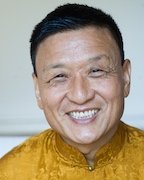 Geshe Tenzin Wangyal is a teacher, acclaimed author, poet, and meditation master in the Tibetan Bön Buddhist tradition. As the founder and spiritual director of Ligmincha International, he has established numerous centers and institutes of learning in the United States, Mexico, South America, Europe and India. Fluent in English, Rinpoche regularly offers online teachings in the form of live webcasts, online workshops and YouTube videos. He is renowned for his depth of wisdom; his clear, engaging teaching style; and his dedication to making the ancient Tibetan teachings highly accessible and relevant to the lives of Westerners. Learn more
Geshe Tenzin Wangyal is a teacher, acclaimed author, poet, and meditation master in the Tibetan Bön Buddhist tradition. As the founder and spiritual director of Ligmincha International, he has established numerous centers and institutes of learning in the United States, Mexico, South America, Europe and India. Fluent in English, Rinpoche regularly offers online teachings in the form of live webcasts, online workshops and YouTube videos. He is renowned for his depth of wisdom; his clear, engaging teaching style; and his dedication to making the ancient Tibetan teachings highly accessible and relevant to the lives of Westerners. Learn more

Question: will there be a translation for non-tibetan speakers?
Antonio, there will be no translation available for this special Tibetan language-only broadcast